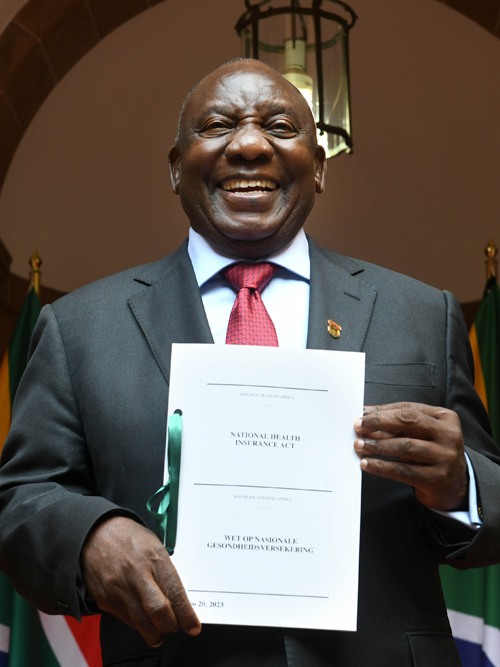Remarks by President Cyril Ramaphosa on the signing of the National Health Insurance (NHI) Bill, Union Buildings, Tshwane

Minister of Health, Dr Joe Phaahla,
MECs of Health,
Senior officials,
Representatives of the health fraternity,
Representatives of civil society,
Representatives of labour,
Members of Parliament’s Portfolio and Select Committees,
Public representatives,
Members of the media,
Distinguished guests,
Ladies and gentlemen,
We are gathered here today to witness the signing into law of the National Health Insurance Bill, a pivotal moment in the transformation of our country.
It is a milestone in South Africa's ongoing quest for a more just society.
This transformational health care initiative gives further effect to our constitutional commitment to progressively realise access to health care services for all its citizens.
At its essence, the NHI is a commitment to eradicate the stark inequalities that have long determined who receives adequate healthcare and who suffers from neglect.
By putting in place a system that ensures equal access to health care regardless of a person’s social and economic circumstances, the NHI takes a bold stride towards a society where no individual must bear an untenable financial burden while seeking medical attention.
This vision is not just about social justice. It is also about efficiency and quality.
The provision of health care in this country is currently fragmented, unsustainable and unacceptable.
The public sector serves a large majority of the population, but faces budget constraints. The private sector serves a fraction of society at a far higher cost without a proportional improvement in health outcomes.
Addressing this imbalance requires a radical reimagining of resource allocation and a steadfast commitment to universal healthcare, a commitment we made to the United Nations.
The real challenge in implementing the NHI lies not in the lack of funds, but in the misallocation of resources that currently favours the private health sector at the expense of public health needs.
The NHI Bill presents an innovative approach to funding universal healthcare based on social solidarity.
It proposes a comprehensive strategy that combines various financial resources, including both additional funding and reallocating funds already in the health system.
This approach ensures contributions from a broader spectrum of society, emphasising the shared responsibility and mutual benefits envisioned by the NHI.
The financial hurdles facing the NHI can be navigated with careful planning, strategic resource allocation and a steadfast commitment to achieving equity.
The NHI carries the potential to transform the healthcare landscape, making the dream of quality, accessible care a reality for all its citizens.
The NHI Fund will procure services from public and private service providers to ensure all South Africans have access to quality health care.
The NHI recognises the respective strengths and capabilities of the public and private health care systems. It aims to ensure that they complement and reinforce each other.
Through more effective collaboration between the public and private sectors, we can ensure that the whole is greater than the sum of its parts.
The effective implementation of the NHI depends on the collective will of the South African people.
We all need to embrace a future where healthcare is a shared national treasure, reflective of the dignity and value we accord to every South African life.
Preparations for the implementation of NHI necessarily require a focused drive to improve the quality of health care.
We have already begun implementing a national quality improvement plan in public and private health care facilities, and are now seeing vast improvement.
In signing this Bill, we are signalling our determination to advance the constitutional right to access health care as articulated in Section 27 of the Constitution.
The passage of the Bill sets the foundation for ending a parallel inequitable health system where those without means are relegated to poor health care.
Under the NHI, access to quality care will be determined by need not by ability to pay. This will produce better health outcomes and prevent avoidable deaths.
The NHI is an important instrument to tackle poverty.
The rising cost of health care makes families poorer.
By contrast, health care provided through the NHI frees up resources in poor families for other essential needs.
The NHI will make health care in the country as a whole more affordable.
The way health care services will be paid for is meant to contain comprehensive health care costs and to ensure the available resources are more efficiently used.
Through the NHI, we plan to improve the effectiveness of health care provision by requiring all health facilities to achieve minimum quality health standards and be accredited.
Following the signing of this Bill, we will be establishing the systems and putting in place the necessary governance structures to implement the NHI based on the primary health care approach.
The implementation of the NHI will be done in a phased approach, with key milestones in each phase, rather than an overnight event.
There has been much debate about this Bill. Some people have expressed concern. Many others have expressed support.
What we need to remember is that South Africa is a constitutional democracy.
The Parliament that adopted this legislation was democratically-elected and its Members carried an electoral mandate to establish a National Health Insurance.
South Africa is also a country governed by the rule of law in which no person may be unduly deprived of their rights.
We are a country that has been built on dialogue and partnership, on working together to overcome differences in pursuit of a better life for all its people.
The NHI is an opportunity to make a break with the inequality and inefficiency that has long characterised our approach to the health of the South African people.
Let us work together, in a spirit of cooperation and solidarity, to make the NHI work.
I thank you.




